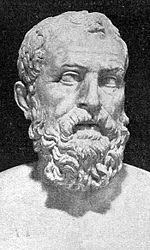- Jahrsiebt
-
Der athenische Gesetzgeber Solon (640 v. Chr.–559 v. Chr.) teilte ein Menschenleben in Hebdomaden (Jahrsiebte, Siebenjahresschritte) ein. Eine Hebdomade steht für sieben Jahre.
- I. (0–7)
- II. (7–14)
- III. (14–21)
- IV. (21–28)
- V. (28–35)
- VI. (35–42)
- VII. (42–49)
- VIII. (49–56)
- IX. (56–63)
- X. (63–70)
Solons „Siebenjahresschritte“ werden in den biographischen Arbeiten Plutarchs erwähnt („Leben Solons“). Englischer Auszug:
The Ages of Man
„A child in his infancy grows his first set of teeth and loses them within seven years. For so long he counts as only a child. When God has brought to accomplishment the next seven-year period, one shows upon his body the signs of maturing youth. In the third period he is still getting his growth, while on his chin the beard comes, to show he is turning from youth to a man. The fourth seven years are the time when every man reaches his highest point of physical strength where men look for prowess achieved. In the fifth period the time is ripe for a young man to think of marriage and children, a family to be raised. The mind of a man comes to full maturity in the sixth period, but he cannot now do as much, nor does he wish that he could. In the seventh period of seven years and in the eighth also for fourteen years in all, his speech is best in his life. He can still do much in his ninth period, but there is a weakening seen in his ability both to think and to speak. But if he completes ten ages of seven years each, full measure, death, when it comes, can no longer be said to come too soon.“
Auch die Anthroposophie und die Pädagogik Rudolf Steiners gehen von einem Sieben-Jahres-Zyklus bei der Entwicklung des Menschen aus. In der Organisation der Waldorfschule spielen diese Zeiträume noch heute eine große Rolle.
Siehe auch
Wikimedia Foundation.

